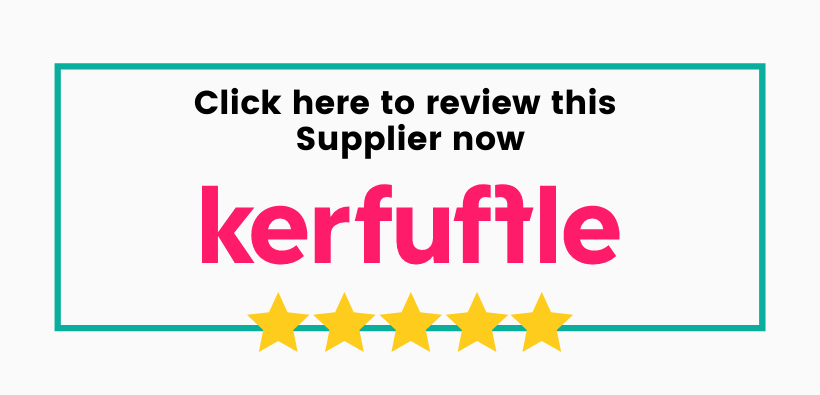Now that deposit replacement schemes have been around for a little while, it’s time to take another look into how they compare to the traditional cash deposit and what to look for when choosing a provider.
Deposit alternatives have been around for a while, but they started becoming popular back in 2019 when the Tenant Fee Ban was introduced which prohibited landlords and letting agents from taking more than 5 weeks’ rent as a deposit (where total annual rent is less than £50,000).
Initially, landlords and agents were sceptical about using a deposit alternative, however appealing they were to tenants. In terms of cover, what was being offered was not much more than was already offered by a cash deposit. The general opinion was ‘if it’s not broken, don't fix it’, but as the fee ban was introduced the issues around cash deposits started coming to light.
As the concept and providers were new, agents and landlords wanted to wait and see whether they would stand the test of time and could be trusted to provide the same level of security as a cash deposit.
As the first deposit alternative provider to appear on the UK rental market, Reposit initially saw an opt-in rate of landlords wanting to offer Reposit to their tenants of 30-40%. Initially offering 6-weeks cover, it was on a similar level to a cash deposit.
Landlords were concerned that using a deposit alternative meant that tenants hadn’t ‘invested’ as much in the rental property & tenancy so have more scope to damage the property, the risks of a deposit alternative being mis-sold to tenants due to a lack of understanding of the products & processes related to them, as well as the products being new and untested.
What’s changed?
Since then the uptake of agents and landlords offering deposit alternatives has skyrocketed. Deposit alternative providers have been tried and tested, and agents and landlords have been able to experience the benefits first-hand.
For example, the uptake of landlords offering Reposit as a deposit alternative has increased to 75-80%, and tenants wanting to pay a Reposit instead of a traditional deposit has gone from 30% to over 60%.
When agents first started selling a deposit alternative, they had to wait until the end of the tenancy to experience the end of tenancy and claims process. It was at this point that the benefits of using a deposit alternative became clear. Not only the extra cover for landlords and reduced costs to tenants but they are also being seen as a tool to accelerate business by reducing admin costs and void periods as well as generating new business and commission streams. Additionally, deposit alternative providers like Reposit require that tenants pass normal referencing to be eligible for the product, or have a guarantor in place to make sure there is no difference with cash deposits.
The smarter, and indeed more popular, deposit alternative providers are now FCA (Financial Conduct Authority) and FSCS (Financial Services Compensation Scheme) regulated, giving that extra level of protection to all involved.
Some providers have now teamed up with CRM software suppliers and referencing prop-tech platforms to integrate their deposit alternative offering into the referencing process.
What is a Deposit Replacement scheme?
In short, deposit replacement schemes offer tenants and landlords an alternative to the traditional ‘cash’ deposit. Instead of tenants paying the equivalent of 5-weeks' rent, they will pay a non-refundable fee to purchase a product or join a service that offers the landlord protection against financial loss. There are also some alternative models in which the agent or landlord purchases the policy to protect themselves.
Landlords and agents will often benefit from increased cover compared to a cash deposit*, as well as access to a dispute resolution service as with cash deposit protection schemes. On top of that, agents are also able to generate a commission from each product or policy purchased by their tenants*.
Tenants themselves are still liable for any unpaid rent or damage to the property. Some schemes may charge an annual or monthly renewal fee for the policy or product.
Deposit replacement schemes are often popular with tenants as it helps to reduce the ‘double bubble’ effect, where they have to pay the deposit for their new property, whilst waiting to receive the deposit back from their old property. Paying a small fee helps to free up their cash flow which can go towards the cost of moving, or buying furniture for their new home.
It’s important to note that letting agents and landlords must give prospective tenants the choice between a deposit replacement scheme and a cash deposit.
Cash Deposit vs. Deposit Alternatives
Level of Protection
As previously mentioned, a cash deposit will require the tenant to provide up to 5 weeks’ rent which will be held in either a government approved custodial or insurance-backed scheme. Landlords and agents are then covered for that amount and no more.
With deposit alternatives, agents and landlords can often benefit from enhanced protection. For example, those who use Reposit as their provider will benefit from an increased 8 weeks’ cover, compared to 5 weeks with a cash deposit.
When it comes to disputes at the end of a tenancy, both options use a third-party impartial adjudicator to manage this as part of the service they provide. Once a decision has been agreed upon, the payment of any money owed by the tenant will also be handled by the provider once instruction has been received.
Tenants
The main benefit to tenants of using a deposit alternative to a cash deposit is cash flow. In 2021 the average deposit amount was £1,000 for England and Wales. That can be a considerable amount of money for tenants to find to secure their new home, whilst their existing deposit is still tied up in their existing property. Using a deposit alternative will eliminate this ‘double bubble’ effect mentioned earlier.
On the other hand, when using a deposit alternative it is wise to be aware that the monies paid are non-refundable and you will not get these back at the end of the tenancy. This is where the potential to receive part or all of the cash deposit back at the end of the tenancy may sway the decision.
However, considering that over 40% of tenants need to borrow money to fund their cash deposit, and with inflation and interest rates on the up, deposit alternatives increasingly represent value for money for tenants.
Tips for tenants
When looking into whether to pay a cash deposit or use a deposit alternative, it’s important to consider which will suit your situation best.
Do you have the funds to pay 5 weeks’ rent upfront and still have monies available for the costs of moving and living? If not, a deposit alternative may be a necessary choice. Even if you do have the funds, consider what else you could do with this money instead of tying it up as a cash deposit. Would you prefer to save or invest this money? Could you use it to pay down other debts such as credit cards or bank overdrafts instead of paying a cash deposit? Are you planning on a holiday or car purchase that you need to save for?
Do your research and get your letting agent to explain what is involved in using their deposit alternative provider including initial costs, ongoing fees and how the end of the tenancy process works to avoid any unwelcome surprises. Provided you are well informed, deposit alternatives may well be the right choice for you.
Agents and Landlords
Since 2007, agents and landlords have been required to protect tenant deposits in a deposit protection scheme. If they do not, they could be liable to repay the full deposit plus, up to three times the deposit amount to the tenant. If the deposit isn't protected and the landlord or letting agent wants to evict a tenant, they may not be able to.
When using a deposit alternative, landlords can mitigate the threat of sanctions from current legislation as a physical deposit will not have been provided. There is still a responsibility for both landlords and agents to thoroughly research their chosen provider to ensure they are ethical and, preferably, independent and FCA regulated as this will ensure that the ‘guarantee’ being offered can be provided.
A strength and indeed a comfort of the cash deposit protection is that they are heavily regulated and monitored by the government and follow current legislative requirements. This only highlights more, the need for landlords and agents to find a deposit alternative provider that is FCA regulated. With that regulation in place, all involved can relax knowing that there is recourse available to them if needed, and the regulated providers can face sanctions if they fail to adhere to established regulatory practices.
It’s clear that the benefit of reduced costs is attractive to tenants, it can often be overlooked that offering a deposit alternative can greatly benefit both landlords and agents. Alongside the increased marketing appeal, landlords will find that their tenants have an additional buffer that they would not otherwise have had if a cash deposit was paid. The biggest risk a landlord takes on when renting out a property is their tenant failing to pay the rent. This risk is reduced when the tenant has that financial buffer so an unexpected emergency is less likely to impact their ability to pay the rent.
The possibility of also generating a commission* on every deposit alternative policy/product purchased can make incorporating this option into their services an attractive option.
“We’ve seen our partner agents gain a lot of benefit from offering Reposit because they can say they offer 8 weeks of cover which no other agency in their area can offer, and they are winning instructions from landlords partly because of that USP. Reposit is a powerful tool to help agents deliver on their main priorities of winning more business from landlords, saving time on admin and diversifying income to their business.” - Gurman Bains, Partnerships Team Leader, Reposit
Tips for landlords and agents
When looking into deposit options, it would be beneficial to your business to offer your tenants the choice of both a cash deposit and a deposit alternative. Not only can this help to reduce the void periods in rental properties, but also provide the opportunity to create an additional revenue stream for the business.
When looking into a deposit alternative provider, you must look for one that offers a robust, regulated and trustworthy scheme. Important questions to ask are:
- Are they FCA regulated
- How much cover will the Landlord get
- How quickly is money paid out to the landlord
- If the company goes under, is the Landlord still covered
- What is the cost to the tenant
- Can the tenant interfere with the policy
- What, as the agent, do I get: Level of commission, End of tenancy process
During the height of the pandemic, some providers changed their offerings to protect their business as they did not have the structure in place to maintain the costs and level of cover they were offering. This kind of information is helpful, as it shows who has the structures in place to maintain and even improve their overall offering and has shown that they can withstand this kind of situation should it happen again in the future.
Choosing a provider that is FCA regulated and underwritten by an insurance provider is the ideal choice as it will mean all involved are protected and can be confident that they are getting the best level of services available. Above all, it is important that they are the right fit and can benefit your business.
Reposit is a deposit alternative provider that allows tenants to pay the equivalent of 1 week’s rent and covers the landlord for up to 8 weeks. To find out more about Reposit, click here.
*depending on the provider.




